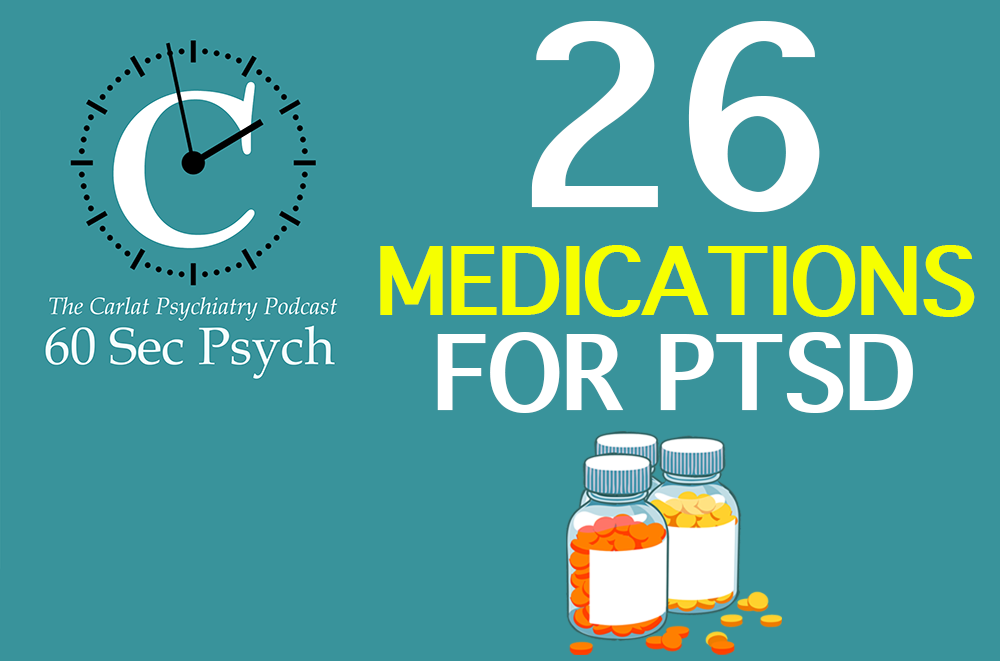26 Medications for PTSD [60 Sec Psych]
, Volume , Number ,
https://www.thecarlatreport.com/#
When it comes to PTSD, pharmacotherapy is second-line and psychotherapy has the more robust evidence. The effect size for therapy is in the large range, while medications are in the small, with one exception…. In studies where patients are allowed to choose their preferred mode of treatment, those who prefer medications tend to do better with them than they do with the therapy route. Published On: 9/30/2020 Duration: 4 minutes, 53 seconds Transcript: When it comes to PTSD, pharmacotherapy is second-line and psychotherapy has the more robust evidence. The effect size for therapy is in the large range, while medications are in the small, with one exception…. In studies where patients are allowed to choose their preferred mode of treatment, those who prefer medications tend to do better with them than they do with the therapy route. Paroxetine and sertraline have FDA approval, but there’s nothing about the pathophysiology of PTSD that points to SSRIs as the curative route. Today’s study – the largest meta analysis to date – compared effect sizes for 26 medications across 58 randomized controlled trials involving close to 7,000 patients with PTSD. Their focus was on efficacy – reduction in symptoms – and tolerability – the rate of discontinuation due to side effects. Here’s what they found. Topiramate, risperidone, quetiapine, paroxetine, venlafaxine, fluoxetine and sertraline all passed muster in terms of their statistical significance. Within that group, Fluoxetine stood out with the best balance of efficacy and acceptability, but this advantage is mainly in its tolerability because its effect size was small. Despite lacking FDA approval, topiramate, risperidone, quetiapine had the largest effect sizes – which were in the medium range of 0.5-0.6. Effect sizes were all in the small range for the other treatments. However, the studies backing topiramate and quetiapine were few and small, so while their high effect is intriguing it’s not definite – small studies are notorious for inflated effect sizes. The surprise finding – to my eyes – was that topiramate came out on top for its efficacy in PTSD. The authors caution that this is based on only 2 randomized trials involving 73 patients. One of those trials was actually negative, but it’s interesting how a negative result can help create a large effect size when added to another trial. There are at least 3 other randomized controlled trials that were left out of the analysis and would bring the total to 217 patients. One of these had a high drop out rate – notably due to side effects on topiramate – and one showed only a trend toward significance, but the other 3 trials were positive. All were small but well designed, and one involved patients with PTSD and alcoholism in whom both the drinking and the PTSD symptoms improved. So what got better with topiramate? Reexperience, avoidance, numbing, intrusive memories, nightmares, sleep, hyperarousal, startle, and irritability Although it lacks the long term safety risks of the antipsychotics, some patients just don’t tolerate the dizziness, visual changes, and cognitive impairment of topiramate, as evinced by the high drop out rate in one of those studies. I find this improves by starting it low – 25mg at night – and raising slowly by 25 mg/week. Topiramate also caries risks of renal stones, glaucoma, metabolic acidosis, and temperature imbalance. But patients who do tolerate it appreciate the weight loss it can bring. Unlike the antidepressants, topiramate is safe in bipolar disorder, and it can help a few comorbidtiies that go along with PTSD, such as borderline personality disorder, impulse control disorders, alcohol and cocaine abuse, and bulimia. Got feedback? Take the podcast survey.




Leave A Comment
You must be logged in to post a comment.